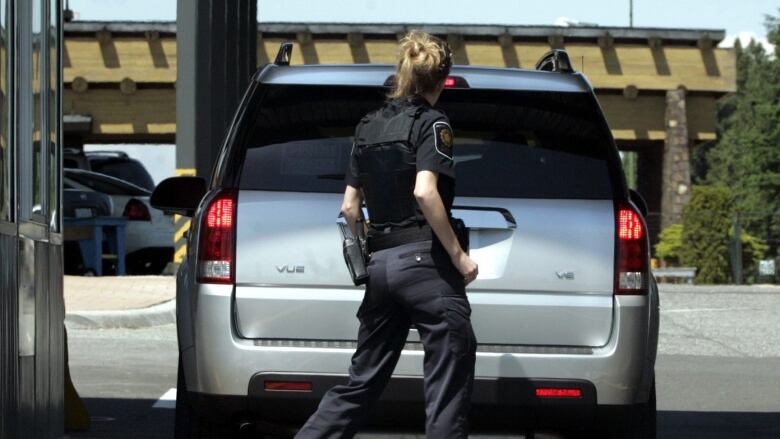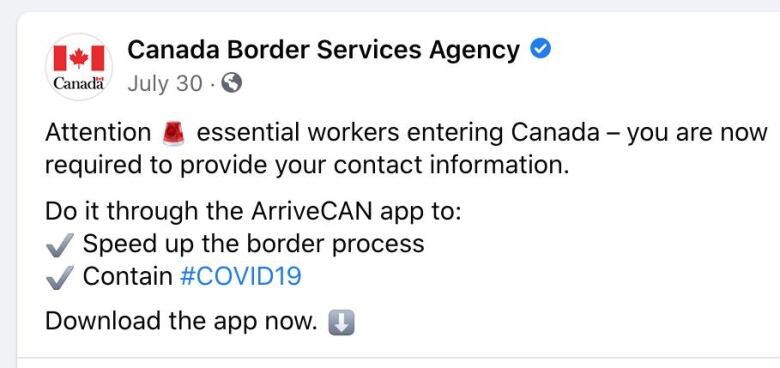Majority of travellers entering Canada during COVID-19 given OK to not quarantine
Experts say routine COVID-19 testing of millions of essential workers crossing border would mitigate risks

More than five million arrivals into Canadahave been allowed to skip the 14-day quarantine requirementput in place when thecountryclosed its borders to non-essential travel in late March, the CanadaBorder Services Agency estimates.
The datawhich wascompiled by the CBSA at the request of CBC Newsshows that more than 80 per cent of the 6.5 million total arrivals into Canadabetween March 31 and Nov. 12 were exempt from the quarantine meant to battle the COVID-19 pandemic.
The arrival numbers include repeat entries by the same person.
The federal government exempts travellers from quarantinewhenthey're providing services deemed "essential."Those exempt include flight crew andemergency response workers, as well astruck drivers who cross the border multiple times.
Truck drivers alone accounted for close to half of the total entries into Canada.
5.3 million exemptions is best guess
The CBSAcalculateda totalof 5.3 million quarantine-exempt entries, but said the number isonly an estimatebecause the federal government didn't start to track everyone in that group until July 31.
The Public Health Agency of Canada (PHAC) said that beforeJuly 31the CBSA collected data on quarantine-exempt travellers crossing the border for statistical purposes, but only when it had the "operational capacity" to do so.

Starting on July 31, PHACchanged its policy and mandated that everyone in that group be tracked, so their contact information could be collected forenforcement purposes.
"Individuals with an exemption from federal quarantine must continue to meet the public health measures in place," spokesperson Tammy Jarbeausaid in an email.
Those measures include wearing a mask, social distancing and rules laid out by local health authorities.
Epidemiologist Colin Furness said that, ideally, thegovernment should have tracked all quarantine-exempt travellers since the start of the border closure in late March.
"I don't think we needed to have COVID on our shores before thinking abouthow do we manage our borders," said Furness, an infection control epidemiologist and professor at the University of Toronto. "There's just a lack of imagination and a lack of preparation."

PHAC didn't explain why it waited four months into the border closure before itstarted collecting contact information forquarantine-exempt travellers.
The agency hascollected contact information for the travellers required to quarantine, for enforcement purposes, since March 31.They includeCanadians vacationingabroad and foreigners visiting immediate family in Canada.
Over the past seven months, the percentage of COVID-19 cases linked to international travel has ranged from 0.4 per cent in May to 2.9 per cent in July, according to PHAC.
Over the past two weeks, 47 international flights entering Canada were found to have had at least one confirmed COVID-19 case onboard.
Exemptions 'critical to our economy'
Jarbeau said the large number of people exempt from quarantine is necessary so that workers "critical to our economy and infrastructure" can do their job after crossing the border.
She said only those essential workers who declare they have no COVID-19 symptoms are allowed to skip quarantine.
WATCH | Businessexecutive exempt fromquarantine
Furness said he understands why essential workers are exempt from quarantine, but takes issue with certain cases, such as businessexecutives who get to bypass the requirement.
Over the past two months, CBC News uncovered three cases where a top executive of a large American or global company travelling to Canada for business got a quarantine exemption.
The federal government said two of those exemptions were a mistake and vowed to fix the problem. It declined to comment on a third case involving the president of U.S. operations for global shipping giant UPS, citing the federal Privacy Act.
"It's unacceptable," said Furness. "I don't understand why we need business travel at all. We've got Zoom.We've got the internet."
Testing pilot project
Epidemiologist Raywat Deonandan said it takes just one infected traveller to spark an outbreak.
"It's possible that a traveller could show up, attend like a church or somethingand then be the trigger for a superspreading event," said Deonandan, a professor at the University of Ottawa.
Both he and Furness suggest that routine COVID-19 testing of essential workers crossing the border would help mitigate potential risks. Testing is not currently a requirement for any traveller entering Canada.
"If we catch some positives that way and prevent somebody from becoming a spreader, that'd be great," said Deonandan.
PHAC said it's currently exploring the concept as part of apilot project offering COVID-19 tests to travellers at two designated border crossings in Alberta.
The agencysaid that travellers who must quarantine and those who are exempt are both being offered tests. Essential workers who cross the border on a regular basis, such as truck drivers, will be offered a test every three to four weeks.













_(720p).jpg)


 OFFICIAL HD MUSIC VIDEO.jpg)
.jpg)



























































































